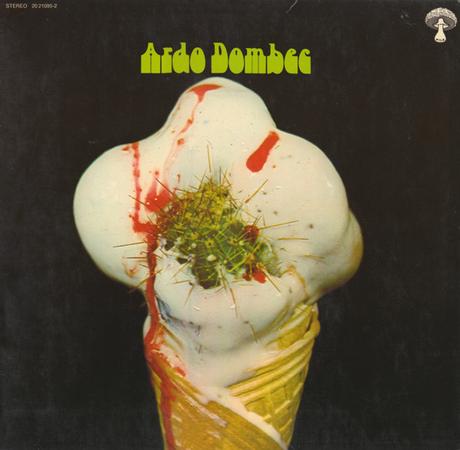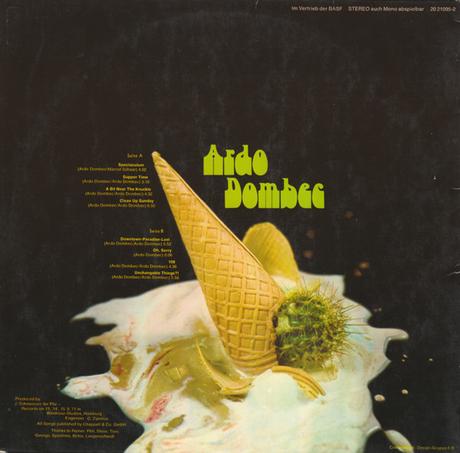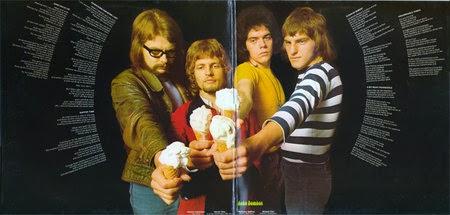 #Músicaparaelencierro. En una semana muy colaborativa y muy vintage, también hay espacio para este ecléctico proyecto germano traído otra vez por nuestro amigo Neckwringer. Esto es esencialmente un rock progresivo joven, con énfasis en melodías de saxos y flautas (con un saxo que recueda las tierras del Canterbury) con una sección rítmica con mucho ritmo, una guitarra jazzy limpia que parece sacada de un álbum de Coltrane de la década anterior, aunque con un toque más agresivo, aquí tienen un disco de proto-prog de una banda de folk-blues-fusion-hard rock que suena como un sofisticado Elvis Presley mezclado con Jethro Tull, Focus, Solution (una banda holandesa que alguien tendría que traer) y Camel. Si todo eso no les llamó la atención, sigan con otra cosa porque me doy por vencido...
#Músicaparaelencierro. En una semana muy colaborativa y muy vintage, también hay espacio para este ecléctico proyecto germano traído otra vez por nuestro amigo Neckwringer. Esto es esencialmente un rock progresivo joven, con énfasis en melodías de saxos y flautas (con un saxo que recueda las tierras del Canterbury) con una sección rítmica con mucho ritmo, una guitarra jazzy limpia que parece sacada de un álbum de Coltrane de la década anterior, aunque con un toque más agresivo, aquí tienen un disco de proto-prog de una banda de folk-blues-fusion-hard rock que suena como un sofisticado Elvis Presley mezclado con Jethro Tull, Focus, Solution (una banda holandesa que alguien tendría que traer) y Camel. Si todo eso no les llamó la atención, sigan con otra cosa porque me doy por vencido...Artista: Ardo Dombec
Álbum: Ardo Dombec
Año: 1971
Género: Progresivo ecléctico
Duración: 46:52
Nacionalidad: Alemania
Buena banda alemana con voces en inglés, su estilo es una mixtura de varios elementos impresos con muchas sonoridades e instrumentos, con el predominio de saxos y flautas.
Lo poco que conseguí averiguar de esta banda germana de los primeros setenta es que grabaron su primer y único álbum con el sello Pilz. Hacían una música muy bien estructurada y basada en un jazz rock, apoyada fundamentalmente en el saxo y flauta de Helmut Hachmann. Su sonido está más vinculado a bandas como Colosseum o los primeros Jethro Tull que a otras bandas consideradas Krautrock.Mingus
Como comentaba antes, su música está muy bien estructurada y con motivos muy variados en sus diversos temas, desde el jazz rock hasta momentos mucho más tranquilos y folk. La calidad de la banda también se hace notar con una muy buena base rítmica, guitarra y lo más sobresaliente que tienen: los saxos y flautas. Las voces sin ser de lo mejor no son malas, recordando en muchos momentos a los grupos acid rock de la costa oeste americana (y lejanamente a otras bandas alemanas como Birth Control y Eloy).
Este no es un álbum esencial y a veces a las composiciones les falta algo de la inspiración y el carácter necesario para alcanzar ese toque de genialidad extra necesario para llegar a lo más alto. Pero aún así es un gran trabajo y merece la pena pararse a escucharlo y, si te gusta, hacerte con él.
 Muchas veces comparada con la banda Colosseum, este disco fue su único lanzamiento. Instrumentalmente impecables, con letras intensas, y con un sonido que dejan una sensación de estar en una jam session, todo en el disco parece casi improvisado, pero al mismo tiempo sofisticado. Este es un producto típico de esos años en Alemania y hay muchos ejemplos como este, que no se inscriben muy bien dentro de lo que se llamó "krautrock", o por lo menos no diría que este es el krautrock típico en el sentido de ser similar a la sonoridad homogénea que lograron bandas como Guru, Can, Ash Ra, Amon Düül II, Faust, y toda esa camada) sino más como un proto-prog, un rock and roll rebelde como era obligación por aquellos años y sobretodo por aquel lugar. La provocación fue realmente lo suyo, ya que tiene una de las pistas más cortas jamás establecidas. Por lo demás, la música es excelente pero ligeramente descuidada en producción. Definitivamente vale la pena pegarle una escuchada cuando puedas, pero tampoco te esperes el nivel que tienen otras maravillas publicadas en el blog cabezón. Es un lindo disco, ni más ni menos, y que no es poco.
Muchas veces comparada con la banda Colosseum, este disco fue su único lanzamiento. Instrumentalmente impecables, con letras intensas, y con un sonido que dejan una sensación de estar en una jam session, todo en el disco parece casi improvisado, pero al mismo tiempo sofisticado. Este es un producto típico de esos años en Alemania y hay muchos ejemplos como este, que no se inscriben muy bien dentro de lo que se llamó "krautrock", o por lo menos no diría que este es el krautrock típico en el sentido de ser similar a la sonoridad homogénea que lograron bandas como Guru, Can, Ash Ra, Amon Düül II, Faust, y toda esa camada) sino más como un proto-prog, un rock and roll rebelde como era obligación por aquellos años y sobretodo por aquel lugar. La provocación fue realmente lo suyo, ya que tiene una de las pistas más cortas jamás establecidas. Por lo demás, la música es excelente pero ligeramente descuidada en producción. Definitivamente vale la pena pegarle una escuchada cuando puedas, pero tampoco te esperes el nivel que tienen otras maravillas publicadas en el blog cabezón. Es un lindo disco, ni más ni menos, y que no es poco.Ardo Dombec se diferenció de otras bandas de folk-blues-fusion-hard rock de principios de los 70 por la presencia de omnipresentes arreglos de unos saxos viscerales, con una base de batería y bajo generalmente rápida, rítmica y algo compleja, en su aspecto general coquetean con elementos de fusión y recuerdan a los primeros Camel pero sin teclados, logrando un resultado agradable, bastante adictiva, pegadizas, y también generando un estilo que tuvo mucha versatilidad que marcaron los primeros surcos infecciosos del rock progresivo.

Los climas de este disco van desde atmósferas densas, flautas extrañas y atractivas que te harán soñar con mañanas de Woodstock junto a chicas jipis desnudas flotando en una nube lisérgica, hasta musculosas y contundentes secciones rockeras con giros y giros que explotan y crepitan de manera maciza, y no falta ni una sorprendente sección de armónica y ese groove infeccioso que hace que este álbum que tal vez carece de una buena producción y esa magia que convierte a algunos discos en superiores, pero en su totalidad poseen fuerza y es muy entretendo.
Muy interesante para que escuches algo distinto a lo que generalmente posteamos y presentamos en el blog cabezón.

I suppose this isn't really worthy of 4 stars in some ways, as it's not everyone's idea of Progressive Rock - there's almost nothing pretentious about it, it doesn't go off on a Classical tip, there's a definite focus and direction to the music as a whole, and it's really not a serious album in any way.Mark
Nevertheless, it is very well crafted, and has a serious amount of entertainment value, whilst carrying flavours of popular Prog Rock bands. It would sit well next to Jethro Tull in your collection, if, indeed, the band were called Jerdo Dombec, or something...
I have to confess, I cheated - I wrote that introduction after I'd ripped the cellophane off, examined the tasteless cover, and had written the review as laid out below ;o). I've never heard this before, but was recommended it by a friend who is a fan of Kraut and insists that I don't listen to enough of it (I always say it sounds like a cross between Pink Floyd and Hawkwind, to his annoyance).
To my utter surprise, it sounds really good - not Prog by any kind of serious definition, but too out there to be anything else. Certainly, more complex than some other stuff I've reviewed recently on this very site, so 4 stars it is.
Spectaculum A set of truly fun(ky) grooves, infused with sax stabs that I would be very surprised if the Hip-Hop community had already exploited to death (if they haven't then keep this one to yourself!). The intial energetic groove is taken back a few gears to something altogether more slinky, before re-asserting itself after a subtle Can-styled strip-back. For fans of the more obscure, there's a passing similarity to Kaputter Hamster here.
There's no holding the grooves back in Supper Time, with quasi-operatic vocals suggesting Arthur Brown. Fun details expose themselves in the music, and the same tempo drop-back technique is used, bringing about a kind of harmonised Doors flavour. A searing dissonant guitar solo scorches its way across the musical landscape, bluffing wildly, but colouring effectively. The band, all the while, providing a some-nonsense, rock-solid boogie.
I'm again reminded of the Kaputter ones in A Bit Near the Knuckle, which is more of the same - solid jazzy, funky grooves, quasi-operatic vocals, time changes, wandering bass lines and fun details in the musical structure. Here, the slower section gets even slower and more laid-back, hinting at Pink Floyd, but with a jazzier, groovy edge and some fun chord leaps - and an even more fun build-up back to the verse. The vocals here are again a cross between Arthur Brown and Jim Morrison, featuring declamations with a core of anger, and the sax dominates proceedings without overpowering them. The solo, particularly is a wicked toe-tapping groove, around which the sax slithers and slides to tremendous effect.
A flute suddenly takes the sax's dominant position for the start of Clean-Up Sunday, a story about a girl halfway between Cinderella and Eleanor Rigby, it seems. Featuring the flute so heavily lends a natural Jethro Tull flavour at some points - but suddenly we drop into the jazziest, funkiest groove so far - around 1:36, and the flautists' vocalisations recall Ian Anderson very strongly indeed - but with something added in the humour department, comical without being ridiculous - a very good job indeed.
Some awesome jazz touches jump out of the groove before it suddenly dies, giving way to an acoustic guitar, which noodles around a little, appears to settle, fades out completely, then gives way to some parallel 5th chanting over tinkly bells, evoking a monastic kind of feel - suggesting the Sunday spirit of the piece, although not for too long. Another groove is laid down on us, with flavours of Jefferson Airplane's White Rabbit, and this grows, bar-by-bar back to the song and the story we've pretty much forgotten about by now!
No real surprises at the start of Downtown Paradise Lost - we're back to the sax dominated texture for an R&B flavoured number about the Red Light District. Despite some hugely emotive outpouring from the singer, and some very enthusiastic kit work from the drummer, there's not a huge amount of excitement to this song, despite its subject matter - although you can clearly hear RAP around 2:25 - to think that rap didn't take off as a genre until at least 10 years later (probably more)!
Here's where the song really hots up, as the story hots up - the music punctuates the action, before dropping into a sultry and suggestive harmonica-topped, hip-shakin' groove. Can't think why they didn't use the sax instead - but it does show up for a turn, before the story is resumed.
Heh - good job I've got a CD, instead of the vinyl (well, you try finding a vinyl copy!), or I might have been fooled by Oh Sorry, a vinyl owner's nightmare.
This is followed by the most progressive piece so far, 108, with a glorious acoustic guitar intro - really, this is how an acoustic intro should be written and played - none of your simple two-chord even-note picking rubbish here - PROPER guitar playing!
I could listen to an album of this, but then the flute joins in and makes it an even more pleasurable listen. OK, the chord sequence IS based around 2 chords here, but it's still fun and interesting, as the flute soars, warbles and chirps beautifully.
The album closes with the rockin' Unchangable Things, which, ironically changes persistently as it progresses over a solid bass groove, before dropping into the sax solo which sounds like it might have been lifted from a Gong album in terms of the overall sound produced. There's then another change to a new groove - and OK, I got the joke in the first sentence. Teutons and their musical jokes, eh?
Monster groove alert around 3:20 - this one's a killer, replete with psychedelic, noodly, wah-drenched guitar solo, which pulls out all the stops to avoid becoming predictable - and largely succeeds.
Despite the English words, a fantastic, fun piece of Krautrock, recalling many of the greats and the obscurites of that genre, but without truly going into full-blown Kosmische, a tremedous work of jazz/funk with wondrous grooves for all to enjoy and nice details in the arrangements to stop Proggers falling asleep.
A real pleasure to listen to and review - and nicely within this particular field of Progressive Rock. I even hung around for the bonus tracks, which are, yes, you guessed it, a lot of fun.
Lista de Temas:
1. Spectaculum
2. Supper Time
3. A Bit Near the Knuckle
4. Clean-Up Sunday
5. Downtown Paradise Lost
6. Oh, Sorry
7. 108
8. Unchangable Things?!
9. Heavenly Rose (Bonus track)
10. Open The Door, Open Your Mind (Bonus track)
11. Young And Strong (Bonus track)
12. Riverside (Bonus track)
Alineación:
- Helmut Hachmann / sax, flute
- Harald Gleu / guitar and vocals
- Wolfgang Spillner / drums and vocals
- Michael Ufer / bass

